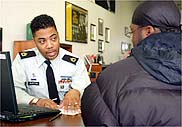February 25, 2002
New Incentive to Join Army: Direct Sign-Up in Green Berets
By JOHN W. FOUNTAIN
 |
| (Todd Rosenberg for The New York Times) |
| Army recruiters like Sgt. First Class Jeremy Burton are pitching a new program that offers direct enlistment in the Special Forces. |
CHICAGO, Feb. 22 — In an unassuming storefront where signs and a life-size cutout of a Special Forces soldier advertise "An Army of One," Sgt. First Class Jeremy Burton delivers his pitch to prospective recruits.
Though he frequently visits high schools and colleges in the Chicago area, most of Sergeant Burton's efforts at persuasion are made right here at a strip mall. And thanks to a a new Army initiative, he can now have young men walk in right off the street and sign up for the elite Special Forces, the Green Berets.
"It's very exciting," Sergeant Burton said. "It's another tool, another opportunity that we have to offer."
Recruits were once able to sign up for the Green Berets when they enlisted. But starting in 1988, those interested had to join the infantry first, then later apply to train for assignment with the Special Forces, whose members customarily have years of soldiering experience.
The new initiative is a way to attract more recruits to the Army. Equally important, it is a way to fill the ranks of the Special Forces.
The downsizing of the Army over the last decade has reduced the number of prospective "in service" recruits for the Special Forces, said Maj. Richard Patterson, a spokesman for the John F. Kennedy Special Warfare Center and School, at Fort Bragg, N.C.
"When you look at when we went to strictly in-service accessions back in the mid-to-late-1980's, and you look at the size of the Army back then versus the draw-down in the 1990's, basically the Army has been cut in about half," Major Patterson said. "The Special Forces units were not cut at all, yet our recruiting base has been cut in half."
The aim of the new program, he said, is "to ensure that we can fill our active-duty and National Guard Special Forces units two, three, four years down the road."
For Eric Leslie, the chance to sign up for the Green Berets directly was a major incentive to enlist in the Army.
Mr. Leslie, 28, of Lincoln, Ill., is one of about 30 recruits across the country who have chosen the Special Forces since the program began in January. He said it was "the mission" and the elite status of the Green Berets that had won him over.
"It had a lot to do with patriotism," said Mr. Leslie, who is single, holds a bachelor's degree in criminal justice and is a former Border Patrol officer now working as a fitness instructor.
"If I become a Special Forces soldier," he said, "my team and I can go into an area, organize and train the indigenous people of that region to carry out missions on their own. The overall impact that I can have on any given situation is increased exponentially."
But signing up for the Special Forces is one thing, earning the beret another. Enlisting, for a minimum of five years, only secures a place in a rigorous two-year training program. Those who do not successfully complete Green Beret training, which as always includes becoming a paratrooper, are reassigned within the Army.
To even be eligible for training, a prospect's scores on aptitude and physical-agility tests must place him among the top half of all recruits. Candidates must also be male, be at least 18, have a high school diploma and meet the Army's weight standards, which vary by height.
In this first year of the program, Army officials hope to recruit 400 new soldiers directly into the Green Berets, whose active-duty force numbers some 6,000.
While the new recruits will most likely be younger than Green Beret trainees who sign up from within the service, and naturally less experienced, Army officials said they feared no lessening of quality.
"The bar is pretty high for earning that Special Forces tab," said Col. Thomas E. Nickerson, an Army spokesman. "This is about a two- year process. Completing the training is very, very challenging. But it's do-able."
That is the hope of Mr. Leslie, who has added to the intensity of his workouts as he prepares to begin training in April.
"There's quite a bit of nervousness," he said. "I'm preparing myself and taking in every bit of information that I've gathered. There are nerves involved, but I feel as if I'll be ready when it comes."
Copyright 2002 The New York Times Company
![]()